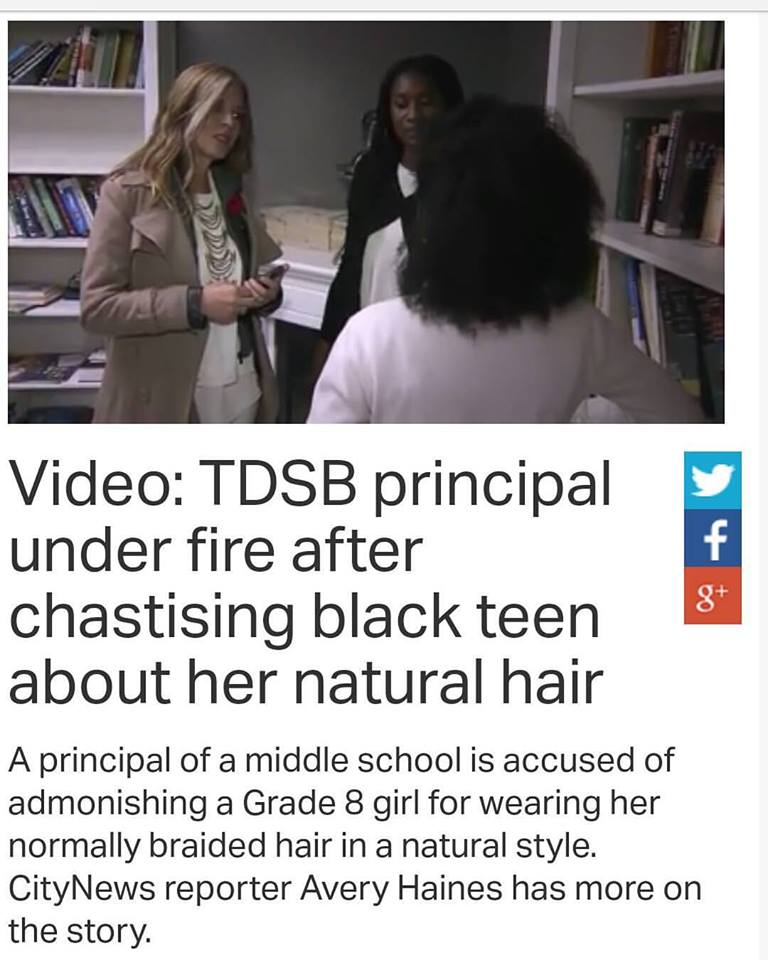 After wearing my hair naturally for years, writing about natural hair, and producing events aimed at the celebration of natural hair, I try to remember to approach conversations from various perspectives. For every woman who is comfortable rocking her Afro puff in the boardroom, there are 3 more Googling "natural hair transitioning" while twirling relaxed locks around their fingers. Natural-haired women sometimes say to me, "We're over asking 'Can you be sexy/professional with natural hair'! It's time to move on!" While I hear that, I acknowledge that we aren't all at the same place in this discussion. That disparity is never more apparent to me than when I hear a flagrantly ignorant comment or the report of some egregious occurrence where someone simply dared to wear their hair with its natural texture. One of those occurrences was recently brought to my attention.
After wearing my hair naturally for years, writing about natural hair, and producing events aimed at the celebration of natural hair, I try to remember to approach conversations from various perspectives. For every woman who is comfortable rocking her Afro puff in the boardroom, there are 3 more Googling "natural hair transitioning" while twirling relaxed locks around their fingers. Natural-haired women sometimes say to me, "We're over asking 'Can you be sexy/professional with natural hair'! It's time to move on!" While I hear that, I acknowledge that we aren't all at the same place in this discussion. That disparity is never more apparent to me than when I hear a flagrantly ignorant comment or the report of some egregious occurrence where someone simply dared to wear their hair with its natural texture. One of those occurrences was recently brought to my attention.
A Facebook status made the rounds this weekend, where a woman in Toronto named Kaysie wrote about her niece. After recently having her hair done in a crochet braid style, her niece was chastised by her middle school principal who first gave her a hair tie and told her to "do something about her hair," then kept her in the office, telling her that her hair was "too poofy," "unprofessional," and that "if she were working in a store, no one would buy anything from her."
After a news story revealed that the principal was herself a Black woman, the reporter asked the women in the salon she reported out of "Does that make a difference?" On the surface, sure - but the root cause of the principal's comments and the reason why she felt empowered in humiliating this young girl is more common than we think. Anti-Blackness and the reverence of European beauty ideals are themes that infiltrate the minds of many, regardless of race. It's why we have people the world over bleaching their skin. It's why we have fashion marketing campaigns choosing White models in order to "convey a positive image." And it's why we have Black women denigrating young Black girls who are proudly wearing their hair in natural styles.
Colonialism did a number on Black people and other people of colour across the globe, and its effects can still be felt throughout the diaspora today. When I decided to wear my hair naturally, some of my biggest detractors were older Black Caribbean and African women, who couldn't fathom why I would choose to run more towards my Blackness than away from it. I am still working to help family members divest from the mental weight of carrying that kind of self-loathing with them, most motivated by comments I've already fielded about Little Magician's hair. Though I've been natural for years and love to cloak myself in the bubble I've built with friends and acquaintances who love and accept natural hair like I do, I will never forget that there are people - many people - like this principal who feel otherwise.
The same anti-Blackness and European veneration I mentioned before are what leads people to incorrectly believe that natural hair is unprofessional, ugly, wild, or a distraction. It's what enables discussion to swirl around the fact that hair is not part of this particular school's dress code, making me believe that this case may create an unnecessary conversation. When a Black girl's hair is up for debate, even the slightest attempt to find a way to regulate it (in this instance through school dress code, which often only reinforces Eurocentric standards) gives me serious pause. It's what sets us - I'm speaking to Black girls and women specifically here - up for failure, constantly chasing an ideal that doesn't belong to us because someone made us falsely believe it was the path to a better/easier life.
I pity the principal of Amesbury Middle School and the fact that she is so dedicated to this fallacy. However, the person I am most concerned about is the child that remains in the midst of this mess. We still have the reminder that there are people entrusted with taking care of our children and shaping their hearts, minds, and souls for the future, but we must remain vigilant and always be our children's fiercest advocates. We still have a Black girl who needs to remember that she is magic, even if others can't recognize her sparkle. We still have much work to do with those among us who believe the lies we've been told about ourselves, and we always need to remember to work internally to ensure we aren't perpetuating those falsehoods consciously or unconsciously.
I don't know what will come of future discussions and interactions between this young girl, her family, and the principal. What I do know is I hope this girl remains uplifted by her loved ones, remains confident (or regains her confidence) in her natural beauty, and continues to side-step the lies while walking in her truth.

